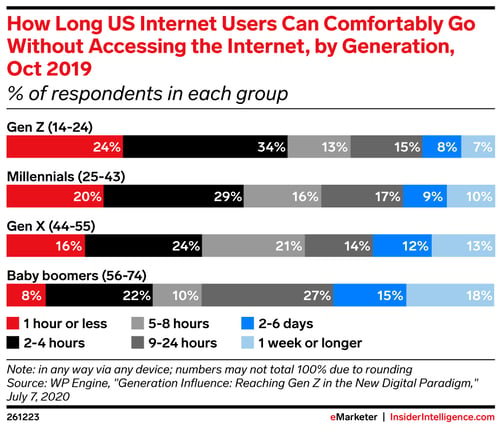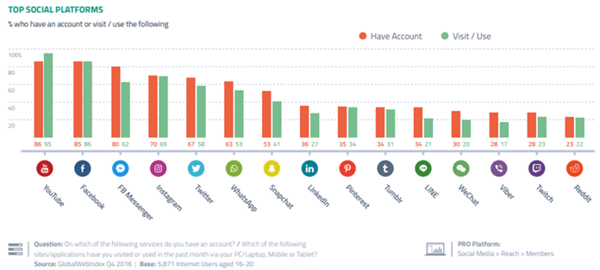Move over MILLENNIALs: Influencer Marketing and Generation Z
At Carusele, we run more than 50 influencer campaigns for major brands every year. When we ask our clients who their ideal target audience is, time and again we hear the same answer – Millennials. Often, it’s a subset of Millennials, such as beauty focused Millennials, or on-the-go Millennials, but it’s almost always Millennials. Given that Millennials are the largest living population segment today, this makes perfect sense. However, brands are beginning to look towards the future as a younger generation begins to emerge as a consumer force.
Enter Generation Z. While Gen Z currently makes up a quarter of the U.S. population, demographic data shows that by 2020 this target group will account for 40% of all consumers. That’s a rapid rise in the next few years.
But is Gen Z the audience that your brand should be targeting via influencer marketing? If so, what are the changes to your approach that this group’s unique mindset will require? Before we know it, this generation will be America’s largest consumer block, so we’ve created this white paper to help you understand who Gen Z is, how their profile differs from Millennials and how their mindset and social media habits will impact your influencer marketing strategy.
Who is Generation Z?
While there's periodic confusion over the exact definition of Millennials, Gen Z is much easier to define. The generation includes those born after 1995. Other generations, such as Baby Boomers, spanned roughly 20 years, so there is not yet consensus on the end date for Generation Z.
While these consumers follow immediately after Millennials, Gen Z is the first generation to grow up surrounded by advanced technology and social media. If your image of Gen Z includes them being attached to a device, you are correct. More than 90% of Gen Zers own a smartphone. They are not only comfortable with and constantly connected to the internet, but they’re the most dependent compared to other generations. Nearly 75% say they could not comfortably go more than eight hours without accessing the Internet.
Perhaps because of the attachment to, and frequent short use of their devices, Gen Z has a much shorter attention span, approximately eight seconds, compared to their elders. That’s a 25% shorter attention span than Millennials. While this means that it’ll be more difficult to gain their attention, this generation does seem to have an innate ability to sort through vast amounts of information quickly. When they do choose to stop and consume content, they’ve found something valuable or beneficial.
Among the many differences between Gen Z and their Millennial predecessors, the most important has nothing to do with their device usage. This generation is known for their realistic focus on the world and ability to plan for the future.
Millennials tend to be very optimistic and live in the moment, while Gen Z is making a conscious effort to seek authenticity. Generation Z is also concerned about and working towards a better future for everyone, and they frequently surround themselves with like-minded people.
This includes identifying with brands and organizations that are trying to make the world a better place. As a result, social content should frequently emphasize the larger mission of a modern brand.
Where Are They on Social Media?
Not only has Gen Z grown up with social media, they’ve also observed how others have used it over the years and adjusted their usage to prevent making any of the mistakes those before them have. They’re known to create different personas on different social networks to appeal to the different audiences and minimize conflict or controversy.
If you’ve heard of people creating a “Finsta,” or fake Instagram account, this is part of that trend. Being able to broadcast to the world was a new experience embraced by older generations. Often, younger people realize the consequences of sharing with the world unfiltered, and they’ve responded by being more guarded and nuanced with their sharing.

As for where they’re spending the majority of their time, we also see differences here from older generations who consume content on Facebook. For Gen Z, YouTube takes the bulk of their attention. Seventy percent of Gen Z prefer YouTube even over broadcast or cable television, and they’re using the platform as a research and collaboration tool for their school work.
As for Facebook usage, Gen Z is still present on the platform but utilizing it less than other generations and more as source for information. Facebook Messenger currently ranks as their primary messaging platform, which is a bit surprising at first blush given the buzz around Snapchat and young people.
Snapchat and Instagram are still battling for their attention, but Snapchat is slowly falling off Gen Zs radar. (Which is likely due in part to the amount of negative feedback since the redesign was launched earlier in 2018.) When they do choose to use the famously ephemeral app, it’s typically depicting real, unfiltered moments that they want to share with their close friends.
Conversely, Instagram is still highly used with 70% of Gen Z having an account (slightly lower than the 85% who have a Facebook account). On Instagram, Gen Z chooses to show off a more curated, aspirational self to a larger audience.
Finally, as you’ll see below in the chart created by Global Web Index, Twitter is still clinging to the top 5, but is primarily used as a source for immediate news. Gen Z is known to check in on the app to see what new conversations are going on around the world.
How to Connect with Gen Z through Influencer Marketing
We’ve established Gen Z’s unique tendencies on social media, but the differences between generations go behind device and platform usage. Because of their different world view, brands attempting to reach them should consider a different approach.
For brands targeting Millennials, we’ve found (in more than 100 such campaigns) that inspirational and aspirational content drives the best results. That content drives the best engagement and even leads to the best business results. If you can inspire Millennials, they’ll often follow through with purchase activities.
Remember, however, that Gen Z is meticulous about who they surround themselves with, and constantly working to make the world a better place. Sixty percent of Gen Zers surveyed indicated they want their jobs to impact the world, and 76% are concerned about humanity’s impact on the planet.
This specific mindset influences which brands Gen Z chooses to engage with. Brands that publicly and authentically make an effort to give back and contribute to a better society will do better overall than those solely focused on commerce. The key, however, and the most difficult challenge, is presenting a brand authentically.
“Greenwashing,” or spending more on marketing a green impression than making an actual difference, is very negatively perceived. Ongoing, sustained initiatives that tie back to a brand’s reason for being are highly valued by this demographic.

Similarly, this thirst for authenticity also impacts the types of influencers that Gen Z follows. In contrast to Millennials, Gen Z is less likely to follow big celebrities or find their content inspiring. A recent survey found that 63% of Gen Zers say they prefer to see real people in advertisements—not celebrities.
Gen Z is looking for relatable, educational and inspiring people and content that reflects their personal values. They are not looking for inspiration from highly polished social scenes that appear unattainable. This makes influencer selection extremely critical for this audience.
Purchase behavior also varies from prior generations. For example, while Gen Z is more likely to purchase items online and on a mobile device, they aren’t shopping as frequently as older generations. While 49% of Gen Z makes a purchase online monthly, this generation is still very young and many of their purchases likely go through their parents. Clearly this will shift as this generation increases their income and takes more control over their personal spending.
Finally, because Gen Z values authenticity, on-going ambassador style influencer programs should be particularly effective with this audience. While we see improved results for all our clients using ambassador style programs, the legitimacy they create should resonate well with a Gen Z audience.
For help reaching your target audience using influencer marketing, contact us using the form below.
.png?width=504&height=360&name=Carusele%20logo%20%C2%AE%20logo%20Color%20(2).png)

.png?width=600&name=Ignite%20Capes%20Deck%20CTA%20(2).png)
